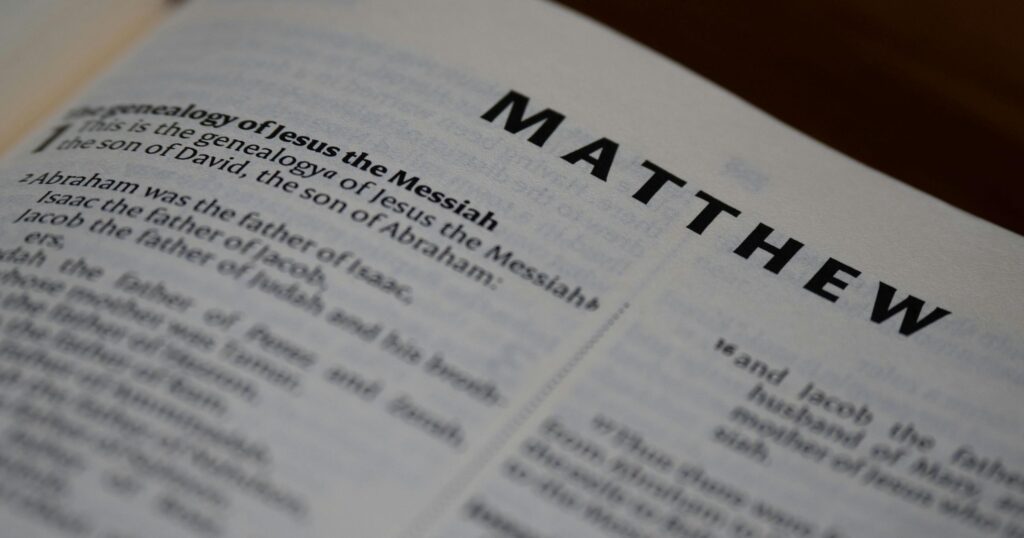
Reading the Bible for the first time can be a little overwhelming. There are so many books, chapters, pages and it’s hard to know exactly where you should start. Do you start at the beginning, the middle, or do you start at the New or Old Testament? There are so many options. In my opinion there is not a bad place to start when reading your Bible, but there are ways to read it for the first time that helps provide context and build understanding. Here is my opinion on the best order to read the Bible for the first time.
1. The Gospels
If you’re reading the Bible for the first time, I would encourage you to start in The Gospels. What are The Gospels you may ask? They are the first 4 books of the New Testament, Matthew, Mark, Luke and John. The Gospels portray the story of Jesus’ life and His teachings. Here’s the order I would suggest reading the Gospels.
- John: John is a great book to start with because it helps us understand who Jesus is and His mission.
- Mark: Mark is the shortest Gospel, which is filled with action and quick transitions. Mark is a good book that gives you an overview of Jesus’ ministry and miracles.
- Matthew: Matthew continues to teach about Jesus’ teachings and His fulfillment of Old Testament prophecies.
- Luke: Luke is the most detailed and compassionate account of Jesus’ life. This book focuses on His interaction with people.
2. Genesis
Genesis is the start of the Bible, the first book to it all – it shows us how detailed God was when He created us and the universe. After the Gospels – try going back to the beginning and read God’s story with creation, the fall of humanity, and the beginnings of God’s relationship with His people. You will learn more about some of the strong faith warriors in this book like Abraham, Isaac, and Jacob.
3. Exodus
Exodus follows Gensis, so once you finish Gensis just keep reading! In this book you’ll learn about Moses, the Israelites’ journey out of Egypt, the giving of the Law, and the establishment of God’s covenant with Israel.
4. Psalms
Psalms is a couple book over from Exodus and can seem daunting when you first look at it. It has over 150 chapter, but each chapter is filled with its own worship, prayer and raw emotion. Psalms will help you connect with God in a personal way while you continue to explore His story.
5. Proverbs
Proverbs is just right after Psalms. This book is filled with practical wisdom for daily life. It has lots of wisdom and is a great book to learn how to apply biblical principles to real-life situations.
6. Acts
Acts is a book in the New Testament that shows us how the early Church began. This book is also a great way to learn how the disciples spread the Gospel and where we learn about the Holy Spirit in more detail.
7. Romans
Right after Acts is Romans! This book is probably one of my favorites in the Bible. It’s a theological cornerstone that explains salvation, grace, and faith in a clear way.
8. Leviticus, Numbers & Deuteronomy
After Romans, head back to the Old Testament and let’s finish the first five books of the Bible. These books help us to get a fuller picture of Israel’s journey, the Law, and their covenant with God.
9. Joshua through 2 Chronicles
After finishing the first five books of the Bible, let’s continue to read more of the Old Testament. Let’s look at reading the next 9 books, I know that seems like a lot, but you’ll learn a lot! These books cover Israel’s history, from the conquest of the Promised Land to the monarchy under Saul, David, and Solomon, and the divided kingdom up to the exile.
10. Ephesians, Philippians, Colossians
After reading those 9 books, you may need a breather from all the history of the Old Testament, so head back over to the New Testament and read Ephesians, Philippians and Colossians. These short but powerful letters by Paul are filled with practical advice on living the Christian life, unity, love, and joy in Christ.
11. Isaiah, Jeremiah, Ezekiel, Daniel, Hosea, & Micah
After finishing up those books in the New Testament let’s go finish some more Old Testament books. Let’s read about the Major and Minor prophets. Prophetic books give insight into God’s messages to Israel and Judah. They also point to the coming Messiah and God’s plan for redemption.
12. Hebrews and James
After reading the books about the prophecy head over to Hebrews. Hebrews shows how Jesus fulfills prophecies and his fulfillment of the Old Testament. Continue reading after Hebrews into James. James offers practical wisdom for living out our faith.
13. Ezra, Nehemiah, Esther
Heading back to the Old Testament, let’s read about what happened after the exile. These three books focus on the return of the Jewish people to Jerusalem, the rebuilding of the temple, and God’s providence.
14. 1 & 2 Timothy, Titus, 1 & 2 Peter, 1, 2 & 3 John, Jude
After reading those 3 Old Testament books let’s head back to the New Testament and take a look at these letters. These letters are ones to encourage believers to stay faithful, live righteously, and resist false teachings.
15. Revelation
Revelation is the last book of the Bible and is a prophetic book that focuses on Christ’s ultimate victory over evil and the hope of eternal life for believers. This can be hard to read and understand, but I believe it is so important to read and learn about, especially in today’s world. It’s an encouragement for believers and should fill us with urgency to share the good news that we have in Christ.
Exploring Additional Books for Wisdom and Reflection
Now there are still a couple books that I did not include, but encourage you to read as well. For example, try out Ecclesiastes & Song of Solomon. These books are wisdom literature that explores life’s meaning and love. Or Lamentations; A book that is poetic reflection on the destruction of Jerusalem. There is not a bad place to start, but I hope this helped and encouraged you to find the best order to read the Bible for the first time for you. The Bible can seem a little intimidating when you are starting out, but it is filled with wisdom, love, grace and is the greatest story ever written. I have found that once you start it – you won’t be able to put it down. I hope this helps you out if you’re just starting to read the Bible. Let me know in the comments what you think is the best order to read the Bible for this first time is!
